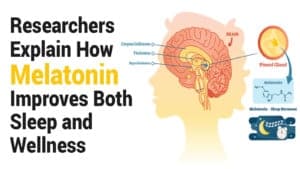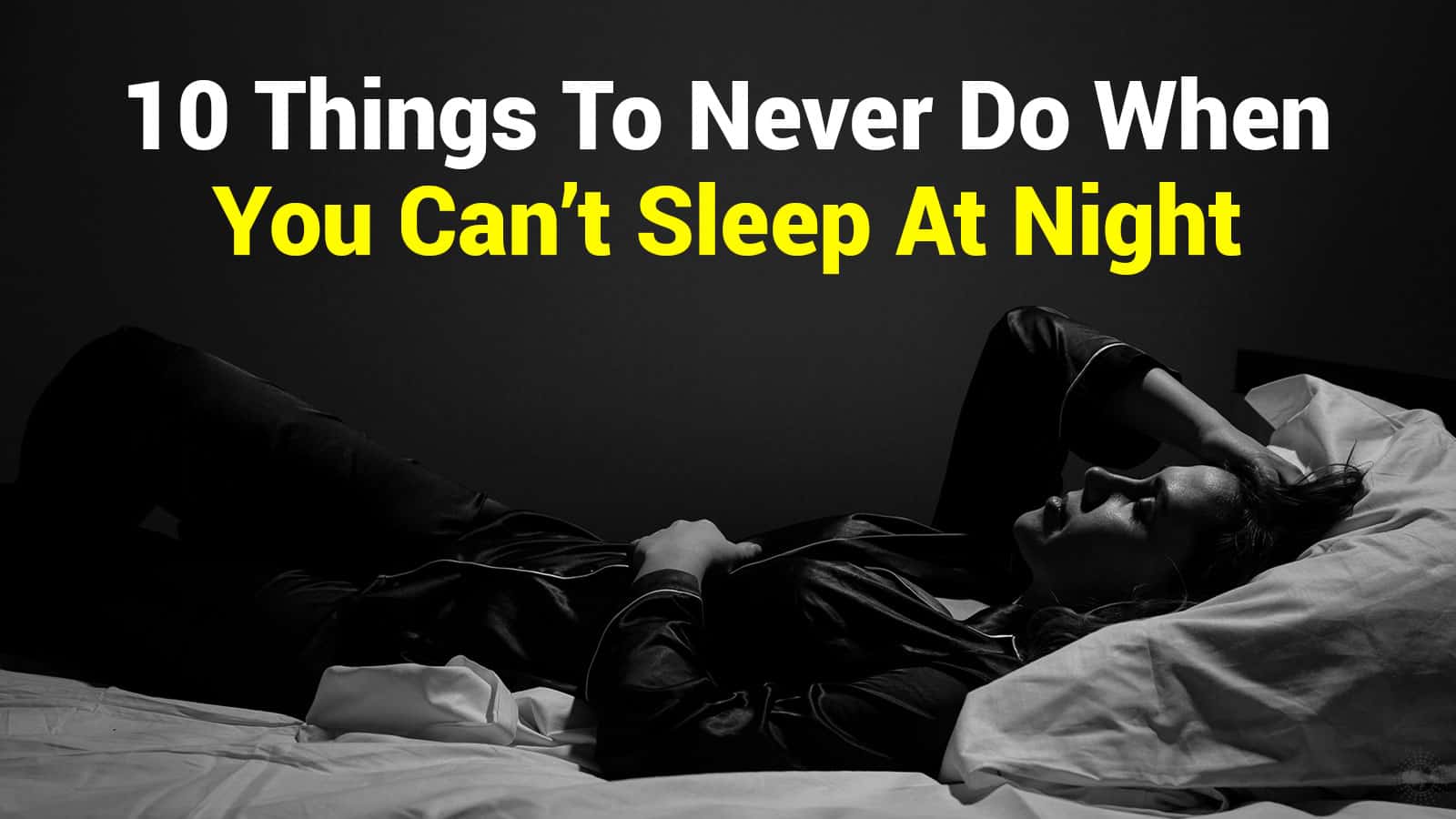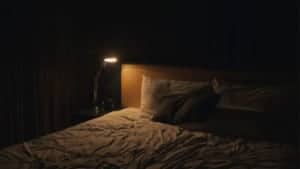Everyone needs a good night’s sleep. When your regular sleep routine gets messed up, it can affect your physical and mental health. Studies show that people’s bad sleep habits often the reason for insomnia. It makes sense then that are several bad habits you should avoid to get better sleep. So, what are the ten things to never do when you can’t sleep at night?
Primary Causes of Poor Sleep
Poor sleep habits aren’t the only reason you may have insomnia. Medical illnesses, medications, and sleep disorders all contribute to poor sleep. See if any of these situations could be the reason you aren’t sleeping well.
Medical causes
Medical problems may interfere with your sleep. Stress from chronic illnesses contributes to insomnia. Here are common medical issues that cause insomnia.
- Respiratory problems
- Heartburn
- Diabetes
- Heart problems
- Kidney disease
- Allergies
- Anxiety
- Depression
- Gastrointestinal problems
- Arthritis
- Asthma
- Neurological disorders
- Thyroid problems
- Acute pain
If you experience insomnia because you suffer from one of these illnesses, talk with your doctor about it. Ask for advice on natural ways to help you relax when you can’t fall asleep.
Medications
Certain medications cause insomnia. It’s hard enough to have an illness that requires medication, but then to have this same medication disrupt your sleep is frustrating. Here is a list of drugs that are known to disrupt sleep.
- Allergy medications
- Asthma meds
- Birth control meds
- Cold and flu meds
- Depression meds
- Heart medications
- Hypertension medications
- Thyroid medication
Ask your doctor to adjust your prescriptions so you won’t lose sleep at night. It may involve taking the meds at a different time during the day, such as not so close to bedtime. If you are on medications, be careful taking sleep medications. They can interfere with your medicine, causing an adverse reaction.
Sleep disorders
If you have a diagnosed sleep disorder, you may experience insomnia. Conditions such as the following can cause these:
- Sleep apnea
- Restless leg syndrome
- Narcolepsy
Here are ten things to never do when you can’t sleep
If you don’t have an illness and you aren’t on medications, and you haven’t been diagnosed with a sleep disorder, you may unintentionally disrupt your sleep by doing these things.
1. Go to bed too late or too early
Going to be too early or too late at night can cause insomnia. It’s best to keep a regular bedtime routine. Try to stay up for at least 16 hours a day, followed by 7 to 8 hours of sleep. Your body clock, aka circadian rhythm, will adjust eventually to this routine, giving you better sleep better all night.
2. Have a different weekend sleeping routine
Keeping a circadian rhythm is vital to fight insomnia. Doctors suggest you keep a regular schedule for going to bed and waking up even on the weekends. Staying up later or sleeping in on the weekend can mess up your body’s sleep rhythm and disrupt your sleep.
3. Drink too much caffeine
It’s not too difficult to lose track of how many cups of coffee you drink a day, but too much caffeine guarantees insomnia. Mayo Clinic suggests that a typical, healthy adult should consume only 400 milligrams of caffeine a day. That’s about three cups of coffee per day. Which, for many people, seems like a small amount. Any more than this can upset your sleep. Don’t forget that tea, soda, and chocolate contain caffeine.
4. Forget that caffeine sticks around
Like many drugs, caffeine stays in your system for hours. Studies show that 50% of the caffeine will remain in your body for five to six hours after you drink it. If you drink coffee or soda with caffeine in the afternoon or evening, it will still be in your system when you go to bed. Even decaf coffee has some caffeine, which can prevent you from getting to sleep or sleeping soundly.
5. Think you need little sleep
The National Sleep Foundation recommends that healthy adults should get 7 to 9 hours of sleep. This amount of sleep works for most people. If you are falling asleep around the same time every night and waking up each morning without an alarm clock, this is a good sleep barometer for how many hours of sleep you need.
Some people need less sleep, but there aren’t many people like this. Historically, people like Benjamin Franklin, Thomas Jefferson, and Leonardo da Vinci were known to need little sleep. Some people, like Winston Churchill and Thomas Edison, didn’t sleep much at night, but they took naps during the day.
6. Use electronics before bed
Many people think using their electronic gadget a great way to relax in the evening. Whether it’s a game on your computer or reading a book on your tablet, late-night electronics are prevalent. Scientists tell us that screen time before bed is a significant contributor to your sleep loss. Your electronic device’s screen emits a light that can interrupt your brain’s production of a chemical called melatonin. Melatonin helps you to sleep, but too little will upset your ability to sleep.
 7. Eat too late
7. Eat too late
Eating heavy or spicy food near bedtime affects your sleep. Eating near your bedtime causes the release of insulin, which breaks up your circadian rhythm or sleep cycle. Food in your stomach triggers your brain and interrupts your ability to sleep.
8. Exercise too close to bedtime
Physical activity right before bedtime is detrimental, falling asleep. It’s best to exercise several hours before you head off to bed and allow your body to wind down as you get closer to be. Exerciser releases your level of stress hormones that keep you awake at night.
9. Having no wind-down time
Your brain needs to transition from high activity to a more relaxed time before bed. This allows your body to re-calibrate from the awake cycle to a sleep cycle. Some suggest that giving yourself up to 45 to 60 minutes of wind-down time without electronics, television, or exercising can impact your sleep significantly. So let’s break it down like this:
- 15-20 minutes of finishing up “must-dos.”
- 20 minutes sleep preparation-brushing teeth, showering and putting on pajamas
- 15-20 minutes relaxing by reading, deep breathing or praying
10. Clock watching
It’s best not to have a digital alarm clock facing your bed, because it may cause you to look at the clock during the night. This habit makes it hard to fall asleep if you keep looking at the clock. So, if you do awaken in the middle of the night and stare at the bright digital clock, it is a massive distraction. That’s because you will keep checking how many hours till it’s time to get up.
So, how do I get to sleep?
If you have insomnia, you are not suffering alone. Around 20% of the population struggles with sleep or feeling rested in the morning. Here are some time-proven techniques that may help you get to sleep and stay asleep.
Relaxation techniques
- Deep muscle relaxation: Tense your muscles and release them, one by one, starting with your legs and working your way up.
- Focus on different parts of your body and relax each part.
- Visualization: Relax using imagery. Imagine a peaceful scene while breathing quietly and calmly. This activity allows you to relax your mind and body.
Should I get up if I can’t sleep?
Experts don’t agree on what you should do if you can’t sleep at night. Some suggest that getting up, doing light activity is helpful. While others say that you should stay in bed to rest even if you can’t sleep. Currently, there isn’t a definitive study on this issue. You need to decide what will work best for you. If getting out of bed stimulates your mind or body, it might be best to settle down under the covers and rest in your bed to wait for sleep to arrive.
Other suggestions:
- Keep your bedroom dark
- Adjust the temperature, so it’s not too cold or too hot
- Go to bed only when you feel tired
- Don’t use your bedroom for watching movies or eating
- Get up every morning at the same time
- Avoid napping during the day
Natural sleep helpers:
- Melatonin-Helpful for sleep and jet lag
- Essential oils like lavender, valerian, bergamot
- Chamomile tea-a cup of chamomile tea before bed has a tremendous sleep-inducing effect
- Magnesium-rich foods or supplement
- John’s Wort-Herbal remedy for sleep
Before you take any herbal remedies, always check with your doctor.
 Final Thoughts: Remember These Tips When You Can’t Sleep at Night
Final Thoughts: Remember These Tips When You Can’t Sleep at Night
Insomnia is a common problem for many Americans. There are many reasons why people don’t sleep well, including medical reasons, medications, or a sleep disorder. Poor sleep habits are often the most significant contributor to insomnia. This list of ten things you shouldn’t do can help you create better sleep habits. Relaxation techniques, herbal remedies, or aromatherapy can help you get better sleep. Doctors disagree whether it’s best to get up in the middle of the night if you can’t sleep. It depends upon what works best for you. Try to establish better sleep habits. These habits can help you have a better sleep and fight insomnia.



















